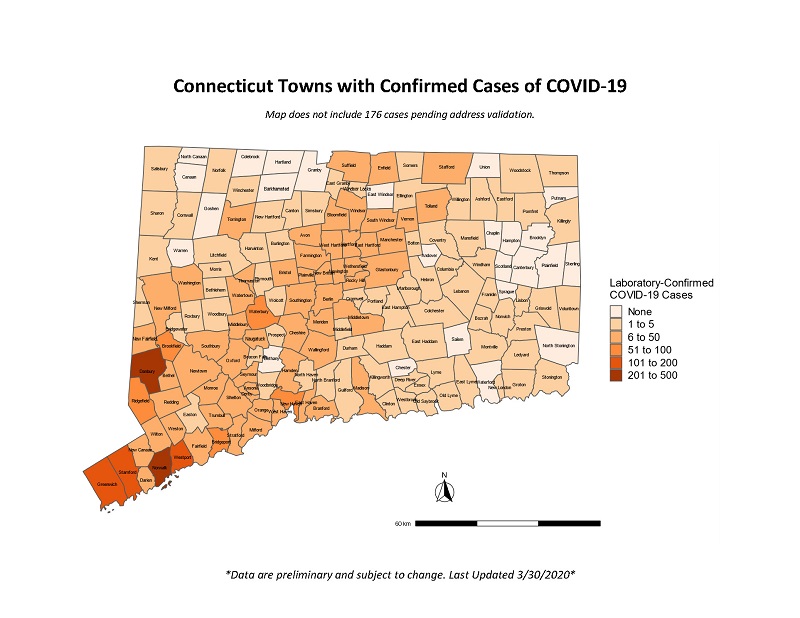

HARTFORD, CT – As the State of Connecticut continues taking actions in response to the global spread of coronavirus disease (COVID-19), Governor Ned Lamont provided the following updates as of 7:00 p.m. on Monday, March 30, 2020:
Data updates on testing in Connecticut
Since yesterday’s update, an additional 578 Connecticut residents have tested positive for COVID-19, bringing the statewide total to 2,571. To date, more than 14,600 tests have been conducted in Connecticut among both state and private laboratories. Approximately 517 people have been hospitalized. There have been another two fatalities due to complications of COVID-19, bringing the statewide total number of fatalities to 36.
A county-by-county breakdown includes:
| County | Laboratory Confirmed Cases | Hospitalized Cases | Deaths |
| Fairfield County | 1,445 | 230 | 21 |
| Hartford County | 330 | 96 | 3 |
| Litchfield County | 113 | 7 | 1 |
| Middlesex County | 50 | 1 | 1 |
| New Haven County | 373 | 176 | 6 |
| New London County | 24 | 5 | 0 |
| Tolland County | 50 | 2 | 4 |
| Windham County | 10 | 0 | 0 |
| Pending address validation | 176 | 0 | 0 |
| Total | 2,571 | 517 | 36 |
For several additional charts and tables containing more data groups, including a town-by-town breakdown of positive cases in each municipality and a breakdown of cases and deaths among age groups, visit ct.gov/coronavirus.

Governor Lamont signs 18th executive order to mitigate the spread of COVID-19
Governor Lamont today signed another executive order – the 18th since he enacted the emergency declarations – that builds upon his efforts to encourage mitigation strategies that slow down transmission of the virus.
Governor Lamont’s Executive Order No. 7Q enacts the following provisions:
- Requirement of limited group sizes in childcare: The order requires all childcare facilities to limit group sizes to no more than 10 children in one space. Any facility caring for more than 30 children must obtain approval from the Office of Early Childhood and demonstrate sufficient separation of groups within the facility. This applies to all childcare facilities, including those that are exempt from licensing requirements.
- Enhancement of health procedures for all operating childcare programs: The order requires all children and childcare staff to be checked at the entrance of childcare facilities for any observable illness, including cough or respiratory distress, and to confirm temperature below 100 degrees Fahrenheit. All staff must adhere to increased handwashing and health practices. Enhanced cleaning and disinfection practices shall be implemented. This applies to all childcare facilities, including those that are exempt from licensing requirements.
- Authorization of remote notarization: The order eliminates all existing legal requirements to have a signature on any document witnessed by a third party, except in the case of a last will and testament. With respect to last wills and testaments, documents may now be witnessed remotely under the supervision of an attorney. In addition to removing witness requirements, any document required to be filed on the land records must contain a one-page certification, completed by a notary or commissioner of the Superior Court, reciting to the fact that the underlying document was executed pursuant to the executive order. The order also requires all town and city clerks to accept those documents for recording.
| **Download: Governor Lamont’s Executive Order No. 7Q |
Governor Lamont forms the Governor’s Health System Response Team to coordinate response for hospitals
Governor Lamont today announced that he is forming the Governor’s Health System Response Team, which will consist of the CEOs from three of Connecticut’s largest hospital systems: Hartford HealthCare, Nuvance Health, and Yale New Haven Health.
The team, in coordination with the Connecticut Hospital Association and the state’s other hospitals, will be responsible for advising the governor, the Department of Public Health and the rest of the state’s Emergency Support Functions in the Unified Command structure on the proper allocation and distribution of needed resources, supplies, and personnel, throughout the duration of the public health emergency.
This group has already been consulting on a regular basis with the Lamont administration prior to the confirmation of the first positive case in the state, and that work will provide the foundation of the plans and actions as the state’s health care system handles an expected surge of COVID-19 cases.
“Our state is going to get through this by working together, and that includes making sure our hospitals are at the table working directly with my administration to ensure they have access to the resources they need,” Governor Lamont said. “These are experts in the healthcare field and our state is incredibly fortunate to have such experience providing counsel as we look to keep as many of our residents safe and healthy as possible.”
For more information, read the press release issued today by Governor Lamont.
U.S. Department of Homeland Security to provide financial support for Governor Lamont’s activation of the Connecticut National Guard
The U.S. Department of Homeland Security today informed the Lamont administration that it will provide 100 percent reimbursement for the costs associated with activating the Connecticut National Guard to provide the state with support in its COVID-19 emergency response. Governor Lamont activated the Guard prior to the first confirmation of a positive case in the state. This is a state activation of the Guard, meaning that Governor Lamont will continue to command Connecticut National Guard forces through Connecticut’s Adjutant General and Joint Staff.
To date the Connecticut Military Department and National Guard has:
- Deployed two of Department of Public Health’s mobile field hospitals at Saint Francis Hospital in Hartford and Danbury Hospital, with a third on the way at Middlesex Hospital in Middletown;
- Provided climate-controlled tents to two VA hospitals in West Haven and Newington;
- Used their Guardsmen that work for major logistics companies to begin managing a warehouse to receive and distribute essential supplies;
- Distributed protective masks, gowns, and face shields to healthcare workers and first responders; and
- Provided medical planners to work with the Department of Public Health to find ways to surge bed capacity and do predictive analysis on how many people the virus will affect.
This week they plan to:
- Deploy the Federal Medical Station with a capacity of 250 beds;
- Convert large spaces at Southern Connecticut State University, Western Connecticut State University, and Webster Bank Arena in Bridgeport into medical surge capacity with approximately 300 beds at each site; and
- Deploy the third Department of Public Health mobile field hospital at Middlesex Hospital.

Public Health commissioner orders suspension of license renewals and payment of associated fees during pandemic
Department of Public Health (DPH) Commissioner Renée D. Coleman-Mitchell today issued an order suspending the need for all DPH licensees to renew their licenses throughout the duration of the declared COVID-19 emergency. This applies to all licenses the agency administers, including those for health care facilities and practitioners. Licensees will not be required to pay the fees associated with the renewals during this time but will be required to pay such fees retroactively when the period of license renewal suspension is over. All active licenses will remain active throughout the duration of the declared emergency.
In addition, the commissioner issued a separate order today temporarily modifying the authority of subregistrars of vital statistics, who are appointed by the local registrars of vital statistics, allowing them to issue burial transit, removal, and cremation permits for any death occurring in any town within the state for the duration of the public health and civil preparedness emergency. One limitation requires that any subregistrar who is an embalmer or funeral director may not issue a cremation permit for a deceased for whom he or she is performing funeral services.
Department of Revenue Services extends filing and payment deadlines for certain small businesses
At the direction of Governor Lamont to provide Connecticut small businesses with immediate administrative tax relief in recognition of the impact of COVID-19, the Department of Revenue Services (DRS) today announced that it granting a two-month extension of filing and payment deadlines for certain small businesses.
“The state needs to be taking all steps possible to provide relief to our small businesses, and this is a prudent step during this public health emergency,” Governor Lamont said.
Taxpayers that have $150,000 or less in annual sales tax liability qualify for an automatic extension of time to file and pay. Similarly, those that have $150,000 or less in annual room occupancy tax also qualify for this relief. Entities that collect both sales tax and room occupancy tax must evaluate each tax separately to determine eligibility for relief.
To determine if it is a qualified small business, entities are required to utilize a calendar year look back period of January 1, 2020 through December 31, 2019. Any taxpayer that reported $150,000 or less in tax during that period qualified for the relief.
Returns covered by this extension includes:
- For monthly sales tax and room occupancy tax filers: Returns and payments due March 31, 2020, and April 30, 2020, are extended to May 31, 2020.
- For quarterly sales tax and room occupancy tax filers: Returns and payments due April 30, 2020, are extended to May, 31, 2020.
“DRS acknowledges that small businesses may need additional time to access their records and consult with their tax preparer,” Acting Revenue Services Commissioner John Biello said. “Taxpayers who file and pay on or before the extended deadlines will not be subject to any penalties or interest.”
Department of Transportation works to ensure service plazas remain open for essential drivers, closes two service plazas on Route 15 due to lack of demand
The Connecticut Department of Transportation has been working with service plaza operators to keep the plazas open as much as possible, with a priority on I-95, in order to serve trucks that are delivering needed supplies to the state. Service plazas on I-95 and I-395 remain open for truckers and essential motorists. Due to lack of demand, the rest areas on Route 15 in Orange and New Canaan have been closed effective today until further notice.
Number of health care professionals registering to volunteer with the state doubles over the weekend
The number of health care professionals who have registered with the state to volunteer their services has doubled over the weekend, reaching a total of 2,079 people who have notified the state expressing interest in volunteering. On Saturday, Governor Lamont released a PSA asking health care professionals – including students and those who are retired – to register with a state database administered by the Department of Public Health, and their services will be matched with Connecticut medical facilities in need. Those interested in volunteering can register online at ctresponds.ct.gov.
“We are seeing Connecticut ingenuity and generosity in action, and I cannot tell you how much we appreciate everyone who is helping out their neighbors in need,” Governor Lamont said.
Attorney General Tong and Consumer Protection Commissioner Seagull warn of potential COVID-19 stimulus check scams
Attorney General William Tong and Connecticut Department of Consumer Protection Commissioner Michelle Seagull are warning Connecticut residents to be on the lookout for potential scams involving future stimulus checks from the federal government. After the federal government enacted a $2 trillion economic stimulus package in response to the COVID-19 pandemic, the state officials’ two offices are beginning to receive reports of bad actors looking to steal American’s personal information and money.
Residents should follow these tips to prevent falling victim to a scam artist:
- The federal government will not ask you to pay money upfront to receive a stimulus check. No fees. No charges.
- The federal government will never call to ask for your Social Security number, bank account or credit card number. Anyone who asks for this personal identifying information is a scammer.
- No matter how the payment is disbursed, only a scammer will ask you to pay to receive it.
For more information, read the press release issued today by the Attorney General and Department of Consumer Protection.
Connecticut receives $5.4 million in federal funding under CARES Act for voting security and safety
Secretary of the State Denise Merill and the members of Connecticut’s Congressional delegation today announced that the State of Connecticut is receiving $5.4 million in federal funding from the Coronavirus Aid, Relief, and Economic Security (CARES) Act that will be used to enhance the safety of in-person voting in polling places, expand vote at home mail-in voting, and protect the security and integrity of the election and the counting of ballots. The CARES Act is providing $400 million to the states, appropriated based on population, to prepare for the impact of the coronavirus on the 2020 election cycle. The virus is forcing states to take new measures to protect the integrity of voting systems and access to the ballot box.
Earlier this month, Governor Lamont signed an executive order using his emergency authority postponing Connecticut’s presidential primary from April 28 to June 2.
For more information, read the press release issued by Secretary Merrill today.
Providing information to Connecticut residents
For the most up-to-date information from the State of Connecticut on COVID-19, including an FAQ and other guidance and resources, residents are encouraged to visit ct.gov/coronavirus.
Individuals who have general questions that are not answered on the website can also call 2-1-1 for assistance. The hotline is available 24 hours a day and has multilingual assistance and TDD/TTY access. It intended to be used by individuals who are not experiencing symptoms but may have general questions related to COVID-19. Anyone experiencing symptoms is strongly urged to contact their medical provider.




